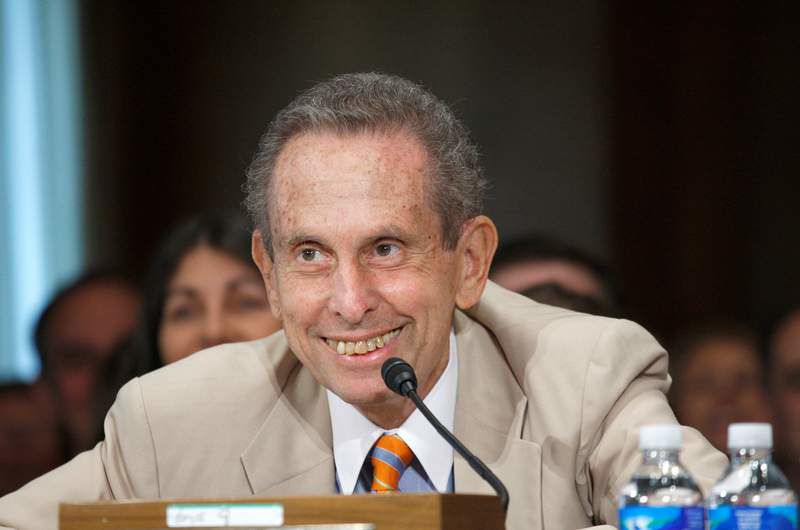U.S. Rep. Stephen Solarz a force in foreign affairs
Published 4:00 am Sunday, December 5, 2010

- Stephen Solarz testifies in 2009 before the Senate Foreign Relations Committee. Solarz, a former New York congressman, died Monday. He was 70.
Stephen Solarz, a nine-term Democratic congressman whose concerns went beyond traffic lights and beach erosion in his Brooklyn district to nuclear weapons, the Middle East and his revelation that Imelda Marcos owned 3,000 pairs of shoes, died Monday in Washington. He was 70 and lived in McLean, Va.
His death, at a Washington hospital, was caused by esophageal cancer, his wife, Nina, said.
Trending
When he was elected to the House in 1974, Solarz finagled a seat on the Foreign Affairs Committee with the idea that he could appeal to his largely Jewish district by attending to the needs of Israel. He immediately threw himself into foreign policy issues, visiting leaders of Israel, Jordan, Egypt and Syria in his first month on the job. He soon became a leading voice in the House on foreign affairs.
Solarz was defeated in a Democratic primary in 1992 after being caught up in a scandal involving the bank operated for House members and after his district had been redrawn to facilitate the election of a Hispanic candidate. (A Hispanic candidate, Nydia Velazquez, went on to win the primary and the general election.)
G
lobal interests
But his arrival in 1975 was a moment of triumph, both for himself and for his party. A huge class of 75 freshman Democrats forced changes in the seniority system, making newer representatives much more influential. The public’s interest in global affairs had been heightened by the Vietnam War, and the abuses of presidential power in the Watergate affair had given new steam to Congress.
“I was elected to Congress at precisely the moment in American history when Congress decided it would no longer abdicate its constitutional authority for foreign policy to an executive branch that had lost its claim to presidential infallibility,” Solarz wrote in his preface to “Journeys to War and Peace: A Congressional Memoir,” to be published in 2011.
Trending
Solarz would go on to be the first congressman to visit North Korea in 30 years; have a nine-hour conversation with Fidel Castro; introduce a nuclear freeze resolution; help alter Reagan administration policies in Central America and Lebanon; and battle many in his own party when he supported the Persian Gulf war in 1991.
Solarz visited more than 100 countries, thus earning his nickname, the Marco Polo of Congress. He once got a standing ovation on the floor of the Indian Parliament.
Solarz’s early battles included an unsuccessful effort to stop the Carter administration’s sale of F-15 jets to Saudi Arabia in 1978. The next year, Solarz was named chairman of the Foreign Affairs Committee’s African subcommittee and worked with President Jimmy Carter to thwart the lifting of sanctions against Rhodesia for its racist policies.
In 1981, he gave up his post on the African subcommittee to take over the subcommittee on Asian and Pacific affairs. There he developed a peace plan that helped end the genocide in Cambodia. He returned from his 1980 visit to North Korea with the news that the country’s dictator, Kim Il Sung, was interested in improving relations with the United States.
In his 1986 hearings on the Philippines, Solarz provided irrefutable evidence that President Ferdinand Marcos was misusing foreign aid, leading to the uncovering of the vast U.S. real estate empire he shared with his wife, Imelda — not to mention Solarz’s blockbuster disclosure about her shoes.
Idealistic, pragmatic
In an interview, Robert Dallek, the presidential historian, praised Solarz’s commitment to building democracy in places like the Philippines, South Korea, Lebanon and Taiwan. “He struck idealistic notes with a lot of his colleagues,” Dallek said.
But he was also pragmatic, said Paul Wolfowitz, the former deputy defense secretary and World Bank president, who worked with Solarz on Asian issues during the Reagan administration. Solarz, he said, showed that allying with forces fighting repression could be good policy.
“Solarz understood that idealism and realism actually go together,” he said.
Stephen Joshua Solarz was born on Sept. 12, 1940, in Manhattan. His parents, Sanford Solarz and the former Ruth Fertig, divorced soon after his birth, and his mother vanished from his life. He was raised first by his father and a stepmother, then by a widowed aunt in Brooklyn after his father divorced again.
His political career began when he was elected president of his sixth-grade class; he was later elected president of the student government at Midwood High School in Brooklyn. After graduating from Brandeis University, where he edited the school newspaper, he entered Columbia Law School. But he quickly became bored by the law and switched his studies, earning a master’s degree in public law and government from Columbia.
While at Columbia he joined the ranks of reform Democrats in Brooklyn, and at 25 he helped run the primary campaign of Melvin Dubin, an anti-war candidate for Congress. Dubin lost, but Solarz met Nina Koldin, whom he later married.
She survives him, as do his mother, Ruth Robin; his brothers, Avrom and Seth Robin; his stepson, Randy Glantz; his stepdaughter, Lisa Prickett; and four grandchildren.
The New York Times reported in 1995 that Nina Solarz had persuaded her husband to run for the state Assembly in 1968 and, using her inheritance, had bankrolled his early campaigns, including his first race for Congress in 1974. She pleaded guilty in 1995 to two criminal charges of writing bad checks against their account at the House bank. Solarz, despite 743 overdrafts, was not charged.
Before running for Congress, Solarz served three terms in the Assembly, where he championed liberal causes like gay rights and prison reform. He lost a race for Brooklyn borough president in 1973.








